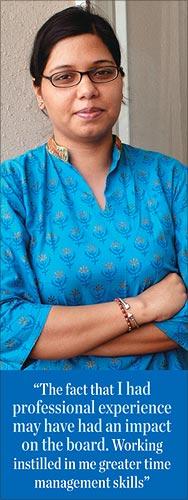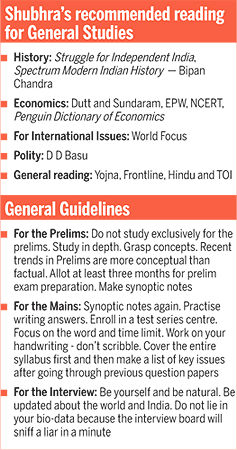You plan to give a national level competitive examination -- like the Indian Administrative Services test.
Many of you want to know: what is that secret ingredient for success?
Does luck play a role?
 According to this year's IAS topper Mona Pruthi, who chatted with Get Ahead readers on May 12: 'Lady luck smiles only when you work hard. Luck may knock at your door but you have to get up and open the door.'
According to this year's IAS topper Mona Pruthi, who chatted with Get Ahead readers on May 12: 'Lady luck smiles only when you work hard. Luck may knock at your door but you have to get up and open the door.'
Mona, who lives in Haryana, has an M Phil in English Literature and currently works with the Indian Revenue Service. This is her third attempt at the IAS examination. She will start training for the post of an IAS officer shortly.
For those of you who missed the chat, here is the transcript:
Mona Pruthi says, Hi I am Mona Pruthi
sai asked, civil service is no longer the first option of the best and the brightest/perception is taht almost all are corrupt ur reaction pl
Mona Pruthi answers, The importance of civil service will always remain. It is a wrong assumption that everyone is corrupt. Lots of good work is being done in the government also.
sanjeev asked, CONGRATULAtions........ What is the secret of ur success.
Mona Pruthi answers, Lots of blessings, God's grace and strategic hard work.
Khokon asked, Hi Mona. Hearty congratualtions for topping the country's most coveted service. Did you attend any coaching class to improve your chances, after all it is fairly OK to that. Regards, smj009@rediffmail.com
Mona Pruthi answers, No.
anupam_srivastava@rediffmail.com asked, what should be the exact age or class when one decides this goal
Mona Pruthi answers, About matriculation.
Vishwa asked, Then wats your aim after winning that exam?
Mona Pruthi answers, Do a lot of good and purposeful work.
ganesh asked, Hi Mona, Congrats. Tell me how to manage time in those exams?
Mona Pruthi answers, Have a time-table. Cover all areas simultaneaously.
gooddude asked, Hello Mona for your success. My question is that how many marks you have you got in graduation? what are your main subjects.
Mona Pruthi answers, Sociology and English Literature.
Jagvir asked, hi mona, pls tell how many hrs per day are enough for preparation
Mona Pruthi answers, Eight hours.
sastry asked, is there any person behind u to get this success
Mona Pruthi answers, My father, late NL Pruthi.
Rajshar asked, Anytime did u feel lack of confidence?
Mona Pruthi answers, Never. Confidence clinches this exam.
prashant_k_001 asked, congrats for topping , but why not to choose IPS,
Mona Pruthi answers, Preferred IAS as it has a very broad and general orientation. IPS is a great service though.
SibiDelhi asked, What you have to say about the double standard in the Education System in India? What steps will you take to correct that, if you get an opportunity?
Mona Pruthi answers, Would you clarify double standards?
Kopal asked, I am doing my graduation in Geography honours from Pune Universty, will sit for the IAS exam in 2008...do you think this is a good subject for the preliminaries & main?
Mona Pruthi answers, Good and scoring.
mads asked, Hi, as this was your 3rd attempt, how did u manage to keep patience?
Mona Pruthi answers, Patience is part of the testing strategy of UPSC.
dilipchakma@rediffmail.com asked, Congrats, Mona. I am from the National Law School and I also aspire to be in the civil services. Is it confidence and self believe that matter the most(given that u topped without joining any institute)? what is it that attracted you to the civil services and that you have made it, what would be your first of all priorities?
Mona Pruthi answers, YES plus hard work. This service allows one to change things in 100s of ways. Get myself trained well.
amitgheji asked, Mona, Why did you want to be an IAS? It doesn't pay all that well, unless you earn under the table. It gives great perks, but they dissapear post retirement. Involves transfers to unknown places (specially for a single woman). Why all this over a software engineer or a doctor or an MBA? You can be frank and tell us if its perks or even under-the-table earnings that attract...
Mona Pruthi answers, All these stakes are well taken to give back to society what we got from it. One has to be prepared for frequent transfers. The good thing about that being that one gets to know the problems of places whose names also were unheard of.
amitjohar asked, Heartiest congratulation.. U cannot change the system since it governs u.. How will u stand if u are being posted in bihar. where there are lots of issues & problems related to terror, politics & violence
Mona Pruthi answers, The best way to change a system is to be situated within it. Bihar also offers lots of opportunities to bring about substantial change.
executioner asked, MONA WILL YOU MARRY ME?
Mona Pruthi answers, Buzz off!
Ashu asked, Mam whats ur opinion which is more lucrative IIM or UPSC as a career
Mona Pruthi answers, IIM is lucrative. UPSC is service of the government.
raj1shekhar asked, Congrats mona, do you really belive that luck plays an important role in going to the top? And most importantly how do u define luck?
Mona Pruthi answers, Lady luck smiles only when you work hard. Luck may knock at your door but you have to get up and open the door.
Gnanes asked, am an architect-urban planner, planning to appear UPSC in 2007...please advice me whe mains and optionals i could take up?
Mona Pruthi answers, You can take geography and sociology/ psychology.
AshishKumar asked, Will it be correct to go for prep after M.Sc.
Mona Pruthi answers, No probs. Go ahead.
atul.sondhi asked, Are you the eldest among brothers or sisters?
Mona Pruthi answers, Youngest.
Bakrishna asked, Mona ji, Sir Mark Tully has said in his book : "I have found so often in India that the government was the problem not the solution….and…that Indian police are only for the poor, they don't touch the rich and the influential…"…we all know that whatever he has written is a fact.How do you think this impression can be changed?
Mona Pruthi answers, In a crisis like the tsunami or while planning a venture like the Delhi metro, it is always the government which rises to the occasion. Change will come with more transparency in government and a more aware people.
zub asked, Are you of the opinion that persons who top Civil Service Exams only by studying Very hard Will be Good Administrators also
Mona Pruthi answers, Only studying hard does not get you to the top. You must also be dedicated and committed to be a good administrator.
chatursb asked, Hi Congrats,, how d u rate ur self.. whats the Success mantra
Mona Pruthi answers, Sincere hard work, clever thinking, time management and a balanced approach.
SibiDelhi asked, You should study what Thampi Kannanthanam and TN Sheshan did in the past. You told me to clarify the double stantard in the Indian Education System. Here it is. There are all the facilities available for rich people and nothing for poor people. The situation is worse in rural areas. We have English medium and local language medium schools. We have Government and private management schools and colleges. Even after scoring 92% marks in maths in matriculation from a local language medium school, I struggled for my higher study. But I can see thousands acquiring seats even after scoring less in exams.
Mona Pruthi answers, Lots of people from rural areas are making it big in life. You can think of new ways and opportunities.
manjit asked, mam i m final year student from PTU nd i want to appear for 2007 so how i can start?
Mona Pruthi answers, Start reading NCERT textbooks from class six to twelve. Select two good options that interest you and work on them. Read the The Hindu newspaper everyday.
prachi asked, mona iam in 12th class commerce stream,can u tell me what areas should i focus upon to get through the iam?
Mona Pruthi answers, General studies, commerce and second optional like economics.
amatnath asked, Hi Monaji. Congrats. My question is "I am working as a software professional and cannot quit my job for monetary reasons. But still I want to prepare for IAS while in the job. I know it is very difficult. But do you think sustained effort (as far as time devoted per day is concerned) over a longer period of time can possibly be a way for IAS preparation"
Mona Pruthi answers, I prepared while being in an employment. Concentration, clever use of available time and resources are important. Yes it is possible.
Mahavir1 asked, Will it be Ok if I prepare for preliminary part time for 8 months and study dedicated for 4 months?
Mona Pruthi answers, More than enough.
braje asked, How do you study? do yo read read and read.. or do you read and write. or some other way of study.. Do you do meditate..?
Mona Pruthi answers, Read, think, write and think again.
amit nanchahal asked, hey mona i am ma eco...but everyone says eco is the most toughest to crack any advice and is it true.
Mona Pruthi answers, Tough but very good subject.
karthikeyan_t asked, Is it more difficult for people who chose 'technical' subjects like medicine as their main subject in the ias exams to pass out?
Mona Pruthi answers, No, lots of doctors get in.
rahul_9051 asked, hi mona............. congratulation Welcome to join our Group........... I am also an I.A.S. of 2004........I got 27th Rank and completed my training.
Mona Pruthi answers, Thanks.
Kunal911 asked, hi, which thing has influenced you most in becoming the exam topper: Failing in the first two attempts or having MPhil in Literature?
Mona Pruthi answers, I didn't fail both. In fact I got IRS in 2004.
kantha asked, Are you going to remove corruption in Public life?
Mona Pruthi answers, Yes, wherever I work.
rajesh_841 asked, mam, pls let me know from where i can get the study material for GS and which books should be refer
Mona Pruthi answers, Libraries, NCERT books and bookshops in Ber Sarai, JNU, Delhi.
TRIASHU11 asked, I WANT TO KNOW HOW TO PREPARE 4G.S.
Mona Pruthi answers, Two good newspapers, current magazines and standard texts like Bipan Chandra and DD Basu.
kanti asked, Hi Mona How are you feeling now after clearing the examination of IAS. Please let me know that what are the major steps whiich you have taken to cross this exam.
Mona Pruthi answers, Feeling good and satisfied with my work. It has been a long journey.
Mona Pruthi says, I'm sorry I couldn't take all the questions. Will chat again soon. Till then work hard, enjoy yourself and take care.


 Q.
Q. 
 According to this year's IAS topper Mona Pruthi, who chatted with Get Ahead readers on May 12: 'Lady luck smiles only when you work hard. Luck may knock at your door but you have to get up and open the door.'
According to this year's IAS topper Mona Pruthi, who chatted with Get Ahead readers on May 12: 'Lady luck smiles only when you work hard. Luck may knock at your door but you have to get up and open the door.'